Hyundai Tucson VS Volvo XC60
In the competitive compact SUV segment, the Hyundai Tucson and Volvo XC60 stand out for their distinct approaches to comfort and technology. The Tucson impresses with its spacious interior and user-friendly tech features, making it a great family vehicle. Meanwhile, the XC60 offers a more luxurious feel with its high-end materials and refined ride, appealing to buyers seeking a premium experience.
Hyundai Tucson
The Hyundai Tucson is a standout choice in the compact SUV segment, offering a perfect blend of style, comfort, and practicality. Its modern design is complemented by a spacious interior that provides ample room for passengers and luggage alike. With advanced technology and safety features, the Tucson ensures a smooth and enjoyable driving experience.
detailsVolvo XC60
The Volvo XC60 strikes a perfect balance between contemporary design and practical functionality, making it an appealing choice for those in search of a reliable and stylish SUV. Its interior showcases a blend of high-quality materials and innovative technology, ensuring a comfortable and seamless driving experience. With its emphasis on safety and environmental sustainability, the XC60 continues to stand out in the competitive SUV market.
detailsA Clash of Titans: Hyundai Tucson vs. Volvo XC60
When it comes to compact SUVs, the Hyundai Tucson and Volvo XC60 stand out in a crowded field. With their distinctive designs, advanced technologies, and varying price points, each offers a unique blend of features appealing to diverse audiences. In this article, we’ll delve into a detailed comparison of these two popular models, focusing on performance, comfort, technology, and innovation.
Price and Value
Price differences are evident right from the start. The Hyundai Tucson offers a more budget-friendly entry point, with prices starting at approximately €34,990 and going up to €54,050 for top trims. In contrast, the Volvo XC60 starts at around €58,590, climbing to a hefty €86,990. This significant price gap signals that while both vehicles deliver quality, buyers looking for luxury and advanced features might lean towards the XC60.
Performance and Powertrains
The Hyundai Tucson is a versatile option available with multiple powertrains including petrol, diesel, full hybrid, and plug-in hybrid options. The range includes engines producing up to 252 HP and torque reaching 367 Nm, allowing for dynamic performance across various trim levels. The Tucson's consumption figures range from 5.1 to 6.8 L/100 km, making it an efficient choice for everyday driving, while the 0 to 100 km/h acceleration capabilities vary from 7.9 to 11.6 seconds, depending on the variant.
On the other hand, the Volvo XC60 is no slouch in terms of performance either, favoring a more powerful selection. Its powertrains are framed around petrol MHEV and plug-in hybrid systems that deliver up to 455 HP and torque figures soaring to 709 Nm. Acceleration from 0 to 100 km/h can be achieved in just 4.9 seconds, showcasing the XC60’s sporty ambitions. Still, the XC60's fuel consumption ranges from 7.7 L/100 km for its petrol engines to a remarkable 0.9 L/100 km for hybrids.
Interior Comfort and Space
Space and comfort are crucial in the compact SUV segment. The Hyundai Tucson is on the generous side with a trunk capacity that ranges from 546 to 620 liters, offering plenty of room for luggage and gear. Its dimensions provide a spacious cabin for five passengers, supported by a solid build quality and innovative seating features.
The Volvo XC60, while slightly smaller in trunk space at around 483 to 468 liters, compensates with premium materials and an upscale finish. The XC60's interior reflects Volvo's commitment to luxury and comfort, offering an inviting atmosphere with ample legroom that is difficult to surpass even in more expensive models.
Technology and Innovations
Both the Hyundai Tucson and Volvo XC60 excel in integrating technology. The Tucson's latest model incorporates a high-resolution touchscreen, Apple CarPlay, and Android Auto as standard, while its safety tech is top-tier with numerous driver assistance systems, showcasing Hyundai's push for innovation in safety.
In the XC60, technology takes a different angle with a focus on luxury and comfort. It features a state-of-the-art infotainment system with a user-friendly interface and premium audio systems that enhance the driving experience. Additionally, advanced safety features, including Pilot Assist, demonstrate Volvo's commitment to enhancing driver assistance technology and ensuring passenger safety.
Final Thoughts: Which SUV Should You Choose?
The choice between the Hyundai Tucson and the Volvo XC60 ultimately hinges on your priorities. If you’re seeking affordability, efficiency, and a feature-rich environment, the Tucson is a strong contender. However, for those willing to invest in luxury, superior performance, and advanced safety features, the XC60 emerges as the clear winner. Both vehicles embody quality craftsmanship and innovative technology, making them worthy competitors in the SUV market.
 @ hyundai.news
@ hyundai.news
 @ hyundai.news
@ hyundai.news
 @ hyundai.news
@ hyundai.news
 @ hyundai.news
@ hyundai.news
 @ hyundai.news
@ hyundai.news
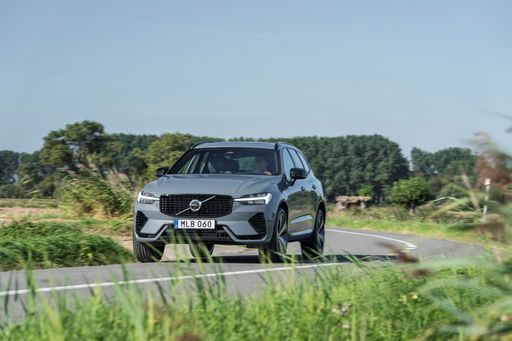 @ media.volvocars.com
@ media.volvocars.com
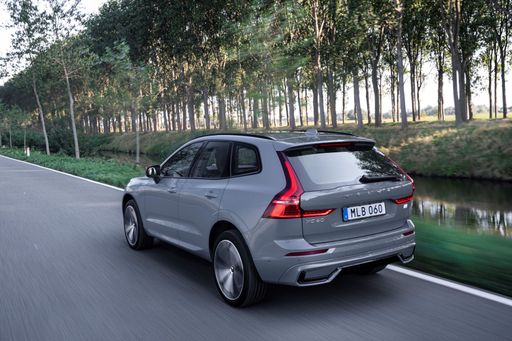 @ media.volvocars.com
@ media.volvocars.com
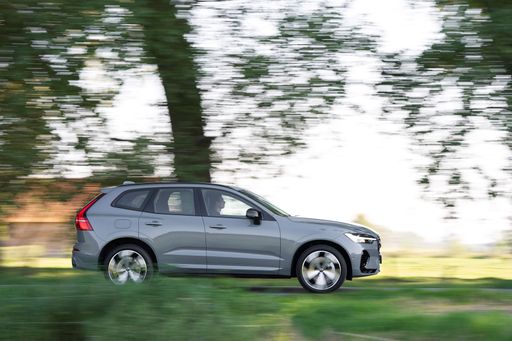 @ media.volvocars.com
@ media.volvocars.com
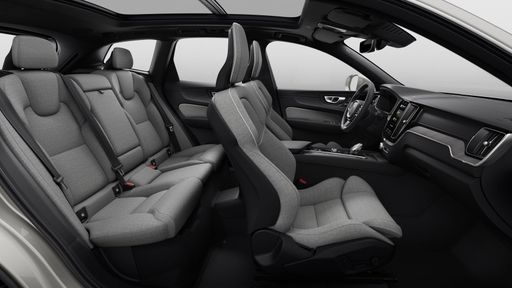 @ media.volvocars.com
@ media.volvocars.com
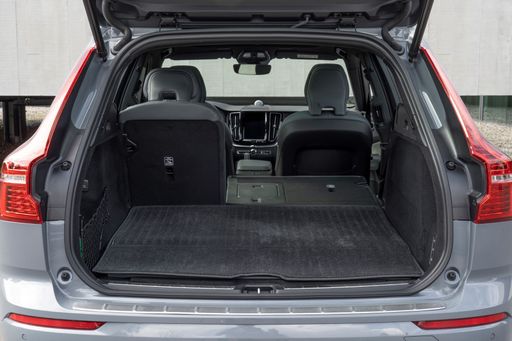 @ media.volvocars.com
@ media.volvocars.com

|

|
|
|
|
Costs and Consumption |
|
|---|---|
|
Price
about 30000 - 46300
£
|
Price
about 48800 - 74600
£
|
|
Consumption L/100km
1 - 6.8
L
|
Consumption L/100km
0.9 - 7.7
L
|
|
Consumption kWh/100km
-
|
Consumption kWh/100km
-
|
|
Electric Range
65 - 70
km
|
Electric Range
79 - 80
km
|
|
Battery Capacity
-
|
Battery Capacity
14.7
kWh
|
|
co2
22 - 153
g/km
|
co2
22 - 174
g/km
|
|
Fuel tank capacity
42 - 54
L
|
Fuel tank capacity
71
L
|
Dimensions and Body |
|
|
Body Type
SUV
|
Body Type
SUV
|
|
Seats
5
|
Seats
5
|
|
Doors
5
|
Doors
5
|
|
Curb weight
1520 - 1889
kg
|
Curb weight
1900 - 2150
kg
|
|
Trunk capacity
546 - 620
L
|
Trunk capacity
468 - 483
L
|
|
Length
4510 - 4520
mm
|
Length
4688
mm
|
|
Width
1865
mm
|
Width
1902
mm
|
|
Height
1650
mm
|
Height
1658
mm
|
|
Payload
525 - 545
kg
|
Payload
510 - 550
kg
|
Engine and Performance |
|
|
Engine Type
Diesel MHEV, Petrol MHEV, Petrol, Full Hybrid, Plugin Hybrid
|
Engine Type
Petrol MHEV, Plugin Hybrid
|
|
Transmission
Automatic, Manuel
|
Transmission
Automatic
|
|
Transmission Detail
Automat. Schaltgetriebe (Doppelkupplung), Manual Gearbox, Automatic Gearbox
|
Transmission Detail
Automatic Gearbox
|
|
Drive Type
Front-Wheel Drive, All-Wheel Drive
|
Drive Type
All-Wheel Drive
|
|
Power HP
136 - 252
HP
|
Power HP
250 - 455
HP
|
|
Acceleration 0-100km/h
7.9 - 11.6
s
|
Acceleration 0-100km/h
4.9 - 6.9
s
|
|
Max Speed
180 - 194
km/h
|
Max Speed
180
km/h
|
|
Torque
265 - 367
Nm
|
Torque
350 - 709
Nm
|
|
Number of Cylinders
4
|
Number of Cylinders
4
|
|
Power kW
100 - 185
kW
|
Power kW
184 - 335
kW
|
|
Engine capacity
1598
cm3
|
Engine capacity
1969
cm3
|
|
Top speed
180 - 194
km/h
|
Top speed
180
km/h
|
General |
|
|
Model Year
2024
|
Model Year
2024
|
|
CO2 Efficiency Class
D, E, B
|
CO2 Efficiency Class
F, B
|
|
Brand
Hyundai
|
Brand
Volvo
|
Hyundai Tucson
Introducing the Hyundai Tucson: An SUV with Innovation at its Core
The Hyundai Tucson has long been synonymous with reliability, comfort, and exceptional value. With its 2024 model, this popular SUV has taken a bold leap forward by incorporating cutting-edge technology, efficient powertrains, and striking design. Let's delve into the technical details and innovations that make the Hyundai Tucson a standout in the crowded SUV market.
Dynamic Engine Options: Power Meets Efficiency
The Tucson offers a range of powertrains, ensuring there is a model perfect for every driver. Whether you're looking for the fuel efficiency of a mild-hybrid diesel or the power of a plug-in hybrid, the Tucson has you covered. The engine options include:
- Diesel Mild-Hybrid: Combining efficiency with robust performance.
- Benzin Mild-Hybrid: Offering a balance between economy and power.
- Voll-Hybrid: Delivering impressive power while maintaining low fuel consumption.
- Plug-in Hybrid: Offering electric-only driving capabilities with a range of up to 65 km.
These engines are paired with either a manual or automatic transmission, catering to different driving preferences.
Performance and Handling: Experience the Drive
The performance of the Hyundai Tucson is designed to impress, with power outputs ranging from 136 to 252 PS. The Tucson accelerates from 0-100 km/h in as little as 8.1 seconds, managed by precise transmission options such as the dual-clutch and traditional automatic gearboxes. With both front-wheel and all-wheel drive options, the Tucson assures stability and control in varied driving conditions.
Interior and Technology: Comfort Meets Cutting-Edge Innovation
The Tucson's interior is a haven of comfort and technology. With a length ranging up to 4520 mm and a spacious boot capacity of 620 litres, practicality is at the forefront. The intuitive infotainment system includes advanced connectivity features, while driver-assist technologies enhance safety and convenience on every journey.
The choice of luxurious trims and finishes, combined with ergonomic design, ensures that every drive is a pleasure, whether you're on a daily commute or an extended adventure.
Environmental Considerations: Efficiency and Sustainability
Hyundai has made notable strides in ensuring that the Tucson is as environmentally friendly as possible. Models with CO2 emissions as low as 27 g/km place it amongst the leaders in its class for eco-friendly driving. The array of hybrid options further complements Hyundai's commitment to sustainability, providing consumers with green alternatives without compromising performance.
Conclusion: The Hyundai Tucson Is More Than Just an SUV
The 2024 Hyundai Tucson is more than just a means of transport—it's a statement of modernity. It reflects Hyundai's dedication to innovation, efficiency, and comfort, all wrapped up in a stylish and versatile SUV. Whether you're tech-savvy, eco-conscious, or performance-oriented, the Tucson proves to be an ideal choice for forward-thinking drivers.
Volvo XC60
Introduction to the Volvo XC60
The Volvo XC60 continues to set the standard in the luxury SUV category, embodying a blend of Scandinavian design, cutting-edge technology, and robust performance. As one of Volvo's best-selling models, the XC60 delivers an exceptional driving experience characterized by its impressive powertrains and a suite of innovative features. This article delves into the technical intricacies and innovative advancements that define the Volvo XC60, highlighting why it remains a top choice for discerning drivers.
Performance and Powertrains
The Volvo XC60 offers a range of powertrains to suit diverse preferences, from the efficient mild-hybrid systems to the powerful plug-in hybrids. The mild-hybrid variants provide a balance of performance and fuel economy, generating up to 250 PS and achieving fuel consumption as low as 7.7 L/100km. Meanwhile, the plug-in hybrid models take efficiency to another level, offering up to 455 PS with remarkably low fuel consumption of just 0.9 L/100km and an electric range of up to 80 km.
Electric Innovation
Volvo’s commitment to sustainability is evident in the XC60's plug-in hybrid models, which offer a battery capacity of 14.7 kWh. This allows for significant electric-only driving, reducing emissions and providing a quieter ride. With a focus on reducing its carbon footprint, Volvo offers some versions with CO2 emissions as low as 22 g/km. The renowned Polestar Engineered package further enhances the driving dynamics, featuring sport-tuned suspension and increased power output.
Advanced Safety Features
Known for prioritising safety, Volvo integrates several advanced safety technologies into the XC60. Standard features include the City Safety suite, which incorporates collision avoidance and mitigation, along with pedestrian detection. The SUV is also equipped with Volvo's Pilot Assist system, an advanced driver assistance feature that aids steering, braking, and acceleration up to 130 km/h, ensuring a more relaxed drive on highways.
Interior Comfort and Technology
The XC60 doesn’t compromise on luxury, offering a spacious interior with high-quality materials and state-of-the-art technology. The standard Sensus infotainment system provides intuitive control over multimedia, navigation, and connected services. Features such as a panoramic sunroof and premium audio systems enhance comfort and driving pleasure, while the adaptive seats and climate control ensure a comfortable environment for all passengers.
Conclusion
The Volvo XC60 exemplifies a harmonious blend of style, technology, and sustainability. With its array of powertrains and cutting-edge features, it meets the needs of a broad range of drivers, maintaining Volvo’s reputation for safety and quality. Whether one opts for the fuel-efficient mild-hybrid or the powerful plug-in hybrid, the XC60 remains a formidable contender in the luxury SUV market, offering a driving experience that is both indulgent and responsible.
